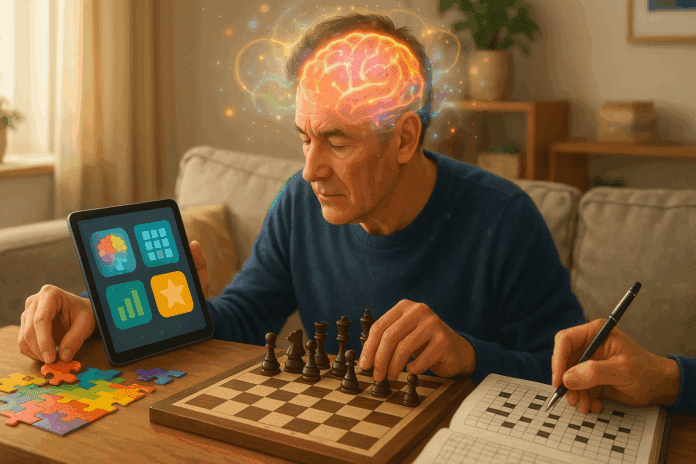
Understanding the Importance of Mental Fitness in Adulthood
Top rated brain games and puzzles for adults play a crucial role in preserving cognitive function as we age, much like physical exercise strengthens the body. Our brains are naturally neuroplastic—capable of adapting and rewiring throughout life—but this potential must be nurtured through consistent mental engagement. Without regular challenges, neural pathways weaken over time, raising the risk of age-related cognitive decline, including memory loss and slower information processing. By incorporating top-rated brain games and puzzles into your routine, you can actively support brain health and maintain sharper mental agility over the years.
In recent years, there has been a surge in interest around cognitive training tools, particularly brain games designed specifically for adults. These games do more than entertain; they offer targeted mental challenges that can help improve memory, attention span, processing speed, and problem-solving skills. Engaging in mental games for adults is not a passive leisure activity—it is an investment in long-term brain health.
Research in neuroscience continues to reveal that playing games to keep your mind sharp may stimulate the formation of new neural connections. This process, known as neurogenesis, is especially important as we age and face the natural decline in gray matter. When adults engage with top rated brain games, they aren’t just passing time—they are actively contributing to their cognitive resilience. Mental fitness, much like physical wellness, is most effective when approached with intention and consistency.
You may also like: Boost Brain Power Naturally: Evidence-Based Cognitive Training Activities and Memory Exercises That Support Long-Term Mental Health
What Makes a Brain Game Effective?
Not all games are created equal when it comes to promoting cognitive health. The best intellectual games are those that challenge multiple domains of brain function, including memory, logic, spatial awareness, language, and executive functioning. While some games rely heavily on rote memorization or speed, others require strategic thinking, pattern recognition, and abstract reasoning—all of which contribute to cognitive flexibility.
The effectiveness of a brain game also depends on its ability to provide adaptive challenges. Cognitive puzzles for adults that evolve in difficulty as a user improves can prevent plateauing and keep the brain in a state of active learning. Furthermore, games that offer immediate feedback and encourage reflection can enhance the learning process by reinforcing correct strategies and adjusting unhelpful ones.
Evidence-based design is another crucial factor. Many of the best brain puzzle apps are developed in collaboration with cognitive scientists and psychologists who understand the principles of neuropsychology and brain training. This scientific backing ensures that users are not just experiencing fun games to help with brain development, but engaging with tools that are genuinely aligned with the brain’s learning processes. A truly effective brain game engages the player emotionally and intellectually, offering both enjoyment and measurable benefits.
How Brain Games Support Long-Term Cognitive Health
Cognitive decline is not inevitable. While aging does bring about certain changes in brain structure and function, the degree to which these changes impact everyday life can be mitigated through proactive mental engagement. Games to keep your mind sharp have been shown to play a protective role against conditions like dementia and Alzheimer’s disease, particularly when paired with other healthy lifestyle habits such as physical exercise, good nutrition, and sufficient sleep.
Regular participation in mental games for adults can help maintain synaptic plasticity, a key mechanism by which the brain stores and retrieves information. These games often require players to remember sequences, solve problems under time constraints, or adapt to new rules—skills that are directly transferable to real-life situations. Whether it’s remembering names, multitasking at work, or learning new technologies, the cognitive benefits of brain games extend beyond the screen.
Moreover, cognitive puzzles for adults may improve emotional regulation and stress management. Playing a challenging but enjoyable game can create a state of flow—complete absorption in an activity—which is known to reduce anxiety and elevate mood. This emotional payoff, combined with the neurological benefits, makes brain games a holistic approach to mental wellness. In essence, the best intellectual games aren’t just tools for brain development; they are preventive medicine for the mind.
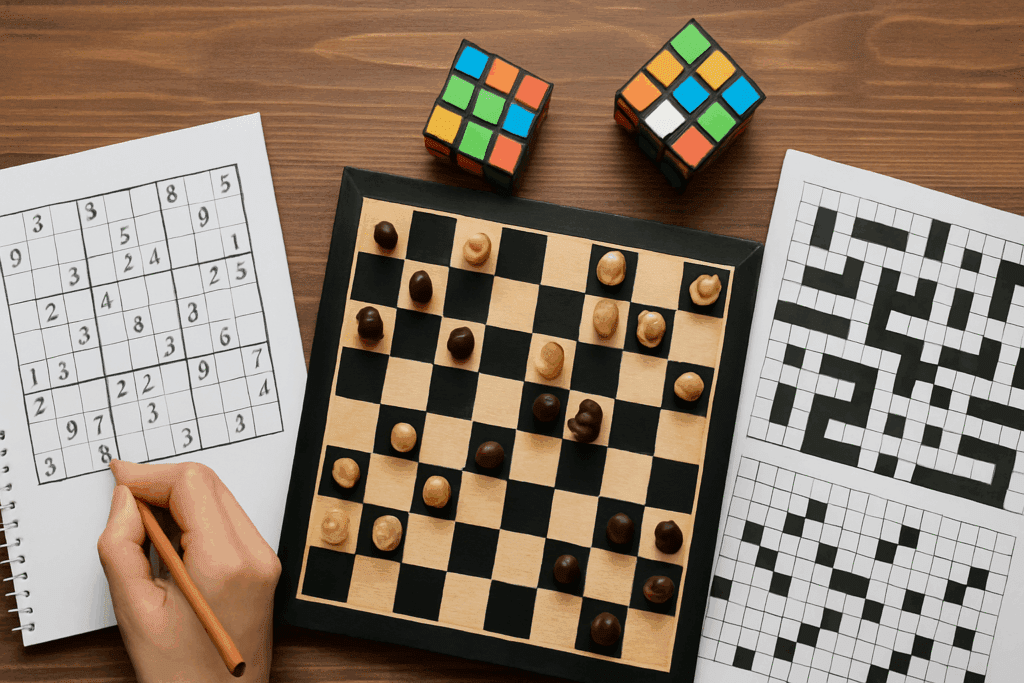
Exploring the Variety of Games That Promote Brain Development
The world of adult brain games is vast and diverse, encompassing everything from digital apps to traditional board games. Each type of game offers unique benefits and targets different cognitive domains. For example, classic puzzles like Sudoku and crosswords are excellent for enhancing logic and vocabulary, while visual-spatial games like Tetris challenge the brain’s ability to recognize patterns and manipulate shapes mentally.
Strategy-based games such as chess or Go require long-term planning and foresight, tapping into executive functions that govern goal-directed behavior. These types of games are often considered among the best intellectual games because they mirror the complexity and unpredictability of real-world decision-making. In contrast, memory card games and matching exercises strengthen short-term memory and attention to detail—skills that can often fade without regular practice.
There is also growing popularity around digital platforms offering best brain puzzle apps tailored for adults. These apps often feature sleek designs, varied game modes, and progress-tracking tools that make cognitive training both convenient and effective. The inclusion of leaderboards or community play features can further boost motivation, making it easier for users to stick with a consistent practice regimen. By selecting fun games to help with brain development, adults can maintain cognitive vitality without sacrificing enjoyment.
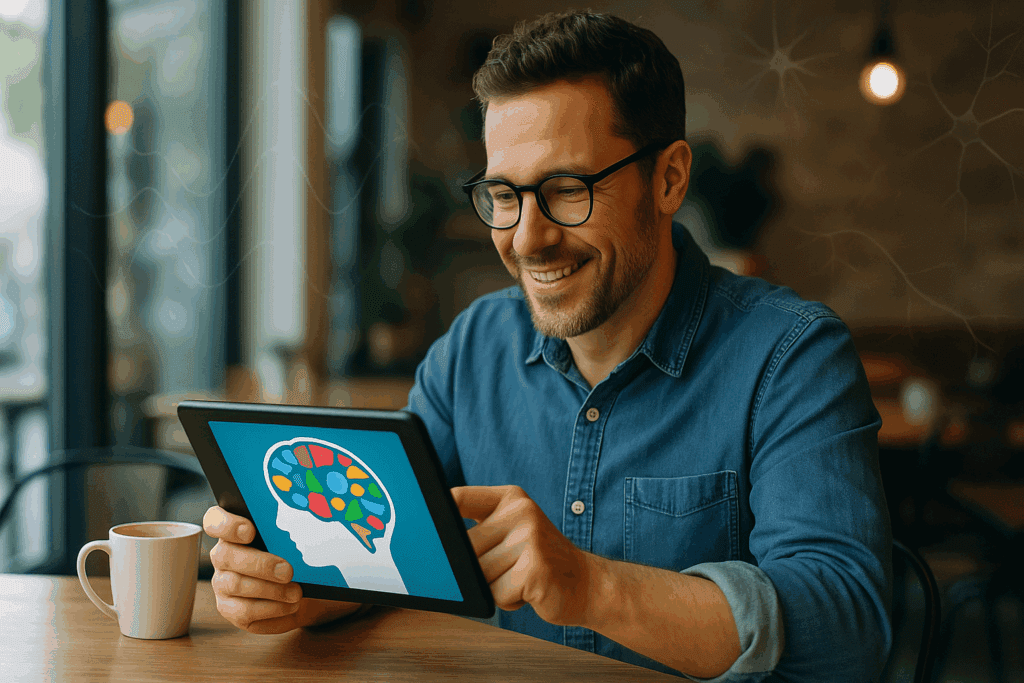
Top Rated Brain Games Backed by Science and User Success
Among the many options available, a few games consistently earn top marks for their evidence-based design and positive user outcomes. Lumosity, for example, is one of the most well-known platforms offering a wide range of games to keep your mind sharp. Developed by neuroscientists, Lumosity provides daily training sessions targeting various cognitive skills and adjusts its difficulty based on the user’s performance.
Another highly regarded app is Peak, which includes games specifically designed for emotional control, language development, and critical thinking. With its intuitive interface and real-time feedback, Peak is among the best brain puzzle apps for adults seeking a more holistic cognitive workout. Similarly, Elevate offers personalized training programs focused on reading comprehension, mental math, and communication skills—areas often overlooked in more general brain games.
For those who prefer analog experiences, games like Scrabble, Boggle, and even jigsaw puzzles have demonstrated cognitive benefits. These games require language processing, spatial reasoning, and attention to detail, all of which are crucial for cognitive longevity. Whether digital or tactile, these top rated brain games deliver real-world results for adults seeking to sharpen their mental acuity.
IQ Games for Adults: Can They Really Boost Intelligence?
IQ games for adults are often marketed as tools for increasing intelligence, but the reality is more nuanced. Intelligence is multifaceted, encompassing a range of abilities including verbal reasoning, spatial processing, working memory, and problem-solving. While a single game may not elevate your IQ score overnight, sustained engagement with a diverse set of mental challenges can enhance the cognitive skills that IQ tests are designed to measure.
Many games categorized as IQ boosters focus on logic puzzles, number sequences, and abstract pattern recognition. These are indeed valuable, as they hone inductive reasoning and mental agility—two hallmarks of intellectual performance. What’s important to understand is that improvement comes not from one-off play, but from consistent and varied practice. When used regularly, IQ games for adults can lead to measurable gains in cognitive performance, even if they don’t directly affect IQ in the strictest sense.
Beyond numerical or verbal skills, these games also improve meta-cognition—the ability to understand and regulate one’s own thinking processes. This self-awareness is a critical component of intelligence that is often overlooked. When adults engage in games that require reflection, adjustment of strategies, and learning from errors, they develop not only sharper minds but more flexible and resilient thinking patterns.
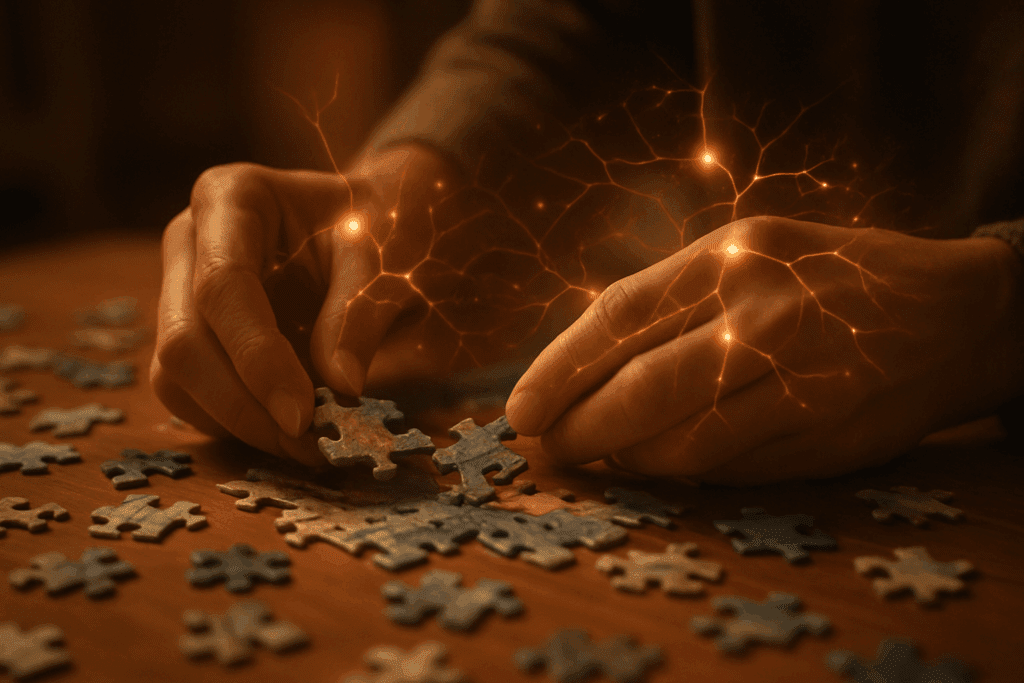
The Role of Puzzle Solving in Maintaining Cognitive Flexibility
Puzzles for brain health serve a special role in preserving and enhancing cognitive flexibility, the mental capacity to switch between thinking about different concepts and adapt to new rules or environments. Whether it’s solving a complex logic puzzle, assembling a 1,000-piece jigsaw, or tackling a lateral thinking challenge, these activities compel the brain to engage in non-linear, dynamic thought processes.
Unlike rote memorization tasks, puzzles activate multiple areas of the brain simultaneously, including those responsible for visual processing, short-term memory, and executive functioning. This multifaceted engagement creates a mental workout that encourages the growth of new neural connections. Over time, these connections form robust neural networks that support faster learning and better adaptation to change.
The popularity of puzzles for brain health lies not only in their versatility but in their accessibility. Anyone, regardless of background or current cognitive ability, can benefit from puzzle-solving. Whether through digital apps or physical books, puzzles meet the user at their level and evolve in complexity over time. This adaptive nature is what makes them a staple among the most effective cognitive tools available today.
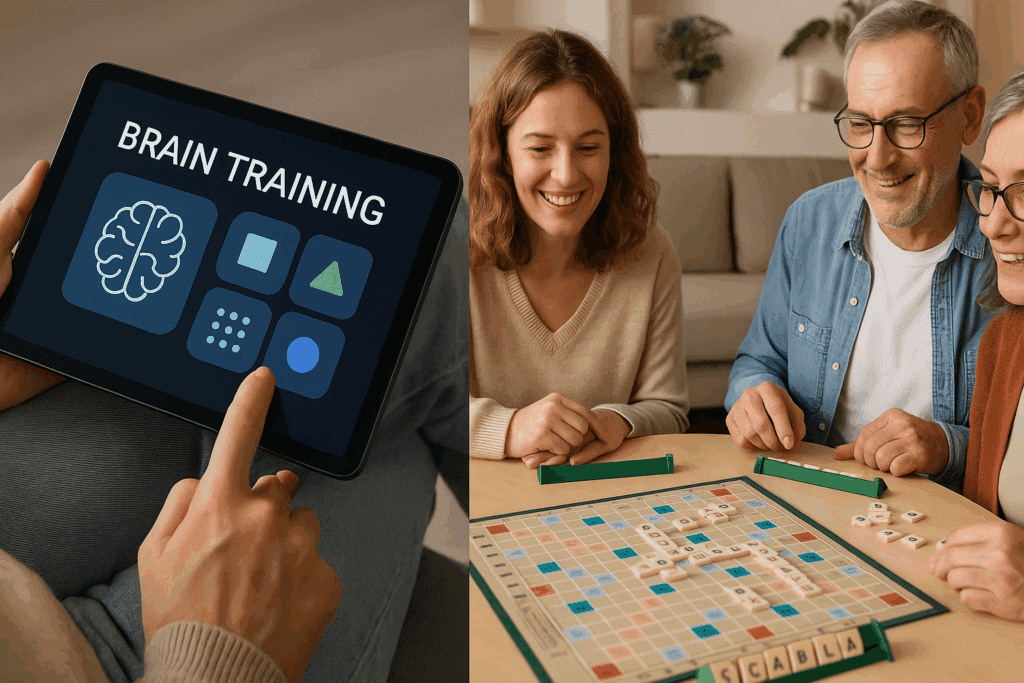
Digital Apps vs. Traditional Games: What’s Better for Brain Health?
When it comes to choosing between digital and traditional games, the answer isn’t either-or—it’s about finding the right balance. Best brain puzzle apps offer convenience, variety, and adaptive difficulty, making them ideal for busy adults who want to incorporate cognitive training into their daily routine. These apps also provide instant feedback, track progress over time, and often include personalized recommendations based on performance.
On the other hand, traditional games provide a different kind of mental stimulation. Board games, card games, and even pen-and-paper puzzles require physical manipulation, which activates fine motor skills alongside cognitive functions. They also promote social interaction, which is itself a powerful contributor to brain health. Social engagement has been linked to reduced rates of cognitive decline, and games that involve collaboration or competition can amplify these benefits.
Ultimately, the most effective cognitive training comes from a combination of both digital and traditional formats. By blending the strengths of each—technology’s adaptability with the tactile and social richness of analog games—adults can create a diverse cognitive toolkit. This integrated approach ensures that all aspects of brain function are addressed and maintained.
Making Brain Games Part of Your Daily Routine
Incorporating brain games into a busy adult lifestyle doesn’t require a complete overhaul of one’s daily schedule. Even short, consistent sessions of 10 to 15 minutes can yield noticeable improvements in attention, memory, and problem-solving abilities. The key is regularity and intentionality. Much like a fitness routine, cognitive training is most effective when it becomes a habit.
Start by identifying games that genuinely interest you—whether that’s a visually engaging app, a challenging crossword puzzle, or a strategic board game. The best intellectual games are those that you look forward to playing, as enjoyment increases adherence. Consider integrating these games into existing routines: play during your morning coffee, on your commute, or as a relaxing wind-down activity before bed.
Social support can also enhance consistency. Sharing your progress with friends, participating in leaderboards, or even scheduling weekly puzzle nights can help reinforce the habit. The goal is not perfection, but persistence. Over time, these small daily efforts accumulate into meaningful cognitive gains, reinforcing the value of good brain games for adults in everyday life.
Frequently Asked Questions (FAQ): Brain Games and Cognitive Health for Adults
1. What are some unexpected benefits of playing good brain games for adults beyond memory improvement?
While memory enhancement is often the headline benefit of good brain games for adults, their advantages stretch far beyond recall. One of the most surprising outcomes is improved decision-making under pressure. Many brain training games simulate real-time challenges that demand quick, logical responses, which enhances your cognitive speed and risk assessment abilities. Additionally, consistent engagement with these games fosters emotional regulation; complex puzzle-solving and frustration tolerance develop resilience and patience, which are beneficial in high-stress personal or professional scenarios. They also subtly cultivate mindfulness, as games require undivided attention to rules, patterns, and sequences, pulling the player into the present moment. This makes brain games not only beneficial for intellectual performance but also for mental well-being and emotional balance.
2. How can fun games to help with brain development support career advancement in knowledge-based industries?
Fun games to help with brain development aren’t just pastimes; they act as cognitive cross-training tools that hone skills vital to success in knowledge-driven careers. For example, pattern recognition games can improve analytical reasoning, a core asset in fields like finance, software engineering, and data science. Language-based puzzles enhance verbal fluency, which is invaluable in law, academia, and communications. Moreover, these games encourage neuroplasticity, allowing professionals to better absorb new information and adapt to evolving industry technologies. The agility gained from regular cognitive challenges translates to sharper meeting performance, faster problem-solving, and stronger interpersonal communication. Brain training becomes not only a wellness habit but also a strategic asset in today’s cognitively demanding work environments.
3. Are there top rated brain games that promote collaboration rather than competition?
Absolutely. While many top rated brain games focus on individual performance, a growing number are designed to be cooperative, encouraging teamwork and social connection. Games like “Keep Talking and Nobody Explodes” require one player to defuse a virtual bomb based on instructions from others, fostering communication, memory recall, and team strategy. Board games such as “Forbidden Island” or “Pandemic” are structured around shared problem-solving and cognitive flexibility, strengthening both cognitive and interpersonal skills. These collaborative formats reduce performance anxiety, making them more inclusive and enjoyable for diverse participants. For older adults or those new to cognitive games, such formats offer a psychologically safe entry point while still supporting essential executive functions like planning, inhibition, and sequencing.
4. What distinguishes the best intellectual games from general entertainment games?
The best intellectual games are defined by their cognitive intention and structural complexity, which distinguish them from general entertainment games. These games are designed with specific neurological outcomes in mind—whether it’s improving working memory, abstract reasoning, or decision-making. Unlike typical video games that might prioritize narrative or aesthetics, intellectual games require mental agility, adaptive thinking, and sustained concentration. Chess, for instance, involves long-term strategy and spatial awareness, while logic grid puzzles demand hypothesis testing and deductive reasoning. The most effective intellectual games often scale in difficulty, allowing players to grow along with the challenge. They balance accessibility with depth, making them ideal tools for cognitive enhancement, unlike more passive or reflex-based gaming formats.
5. How do games to keep your mind sharp support cognitive aging differently than traditional learning methods?
Games to keep your mind sharp differ from traditional learning by emphasizing interactive, nonlinear engagement rather than rote memorization or passive information intake. They present cognitive tasks in dynamic formats that mimic real-world mental demands, such as multitasking, time management, and prioritization under pressure. This approach enhances transferability—skills gained in the game setting often carry over into everyday cognitive tasks. Additionally, brain games activate emotional centers through play and reward systems, which enhances memory consolidation and learning retention. Compared to traditional educational tools, brain games are also more accessible and customizable, allowing aging adults to engage at their own pace while targeting specific areas of concern such as attention span, mental flexibility, and processing speed.
6. What are the benefits of integrating mental games for adults into group wellness programs?
Incorporating mental games for adults into group wellness settings—whether in corporate offices, retirement communities, or healthcare facilities—amplifies both their cognitive and social benefits. Group play introduces a social stimulation element that research shows can protect against loneliness-induced cognitive decline. Collaborative gameplay promotes empathy, communication, and problem-solving under shared goals, building stronger interpersonal relationships and group cohesion. In occupational settings, these games can foster team bonding and creative synergy, while in elder care environments, they encourage engagement and autonomy. Mental games for adults are also highly adaptable for different ability levels, making them ideal for inclusive wellness programming. Their gamified structure keeps participation enjoyable, thus improving adherence compared to traditional cognitive exercises.
7. Are cognitive puzzles for adults effective for managing early cognitive decline or mild cognitive impairment (MCI)?
Emerging research supports the use of cognitive puzzles for adults as part of a non-pharmacological strategy to manage early cognitive decline and MCI. These puzzles stimulate neural circuits involved in executive function, spatial reasoning, and language, which are areas commonly affected in early-stage impairment. Unlike passive memory exercises, puzzles challenge users to apply reasoning in novel ways, encouraging the brain to form compensatory strategies. Additionally, the consistent practice involved in solving cognitive puzzles can boost confidence and mood, which are often negatively impacted by early cognitive concerns. While they are not a cure, puzzles serve as proactive tools to maintain engagement, autonomy, and cognitive resilience in affected individuals.
8. How do puzzles for brain health affect stress levels and mental clarity in high-pressure lifestyles?
Puzzles for brain health serve as cognitive “reset buttons” in high-pressure routines by inducing a flow state—a focused, enjoyable mental zone that reduces cortisol levels and enhances clarity. Regularly engaging with puzzles has been shown to decrease perceived stress, much like meditation or mindfulness practices, but with an added layer of cognitive activation. These activities shift attention away from worry loops or decision fatigue, offering a structured challenge that is both soothing and stimulating. Puzzles also promote dopamine release upon task completion, which reinforces motivation and satisfaction. For professionals or caregivers navigating intense mental loads, dedicating even 15 minutes daily to puzzle-solving can serve as a low-cost, high-impact mental refresh.
9. What role do iq games for adults play in neurodiversity and cognitive inclusivity?
IQ games for adults are increasingly being recognized as tools to support neurodiverse populations, including those with ADHD, autism spectrum conditions, and learning differences. These games can be tailored to emphasize strengths—such as pattern recognition, logic, or spatial reasoning—while gently supporting areas of challenge. Many platforms offer adaptive difficulty and multi-sensory feedback, which can enhance accessibility and engagement for diverse cognitive styles. For instance, visual-spatial IQ games may benefit autistic adults with strong visual thinking, while sequencing games can assist those working on executive function skills. When thoughtfully selected, iq games for adults become more than training tools—they become empowering platforms that celebrate and accommodate varied neurocognitive profiles.
10. How can the best brain puzzle apps be used to measure and track cognitive progress over time?
The best brain puzzle apps do more than offer entertainment—they provide built-in analytics and performance dashboards that enable users to monitor progress and identify cognitive strengths and weaknesses. Many apps use algorithms that track metrics like accuracy, reaction time, task complexity, and error patterns across sessions. This data can be invaluable for setting personalized cognitive goals, adapting challenge levels, and recognizing improvement trends. Some platforms even allow integration with health records or wearable devices to correlate mental performance with physical or emotional states. By using these tools consistently, individuals can gain a clearer understanding of their cognitive trajectory and make informed decisions about lifestyle changes or further interventions. These apps, when used strategically, transform casual gaming into actionable cognitive self-assessment tools.
Conclusion: Investing in Your Mind with the Best Brain Games and Puzzles for Adults
As science continues to explore the complex dynamics of brain health and aging, one truth remains clear: the brain thrives on challenge. Engaging regularly with fun games to help with brain development is not merely a pastime—it is a proactive step toward preserving mental agility, emotional well-being, and lifelong learning. Whether you’re drawn to strategic board games, immersive mobile apps, or classic puzzles, the act of exercising your mind has lasting rewards.
The key lies in choosing tools that are not only enjoyable but grounded in cognitive science. The best brain puzzle apps, along with IQ games for adults and traditional cognitive puzzles, provide a rich landscape for mental enrichment. They foster critical skills such as memory retention, problem-solving, and adaptability—qualities essential not only for aging well but for thriving in a complex world.
Ultimately, games to keep your mind sharp are more than entertainment; they are a vital part of your mental wellness toolkit. By integrating these evidence-based activities into your daily life, you are investing in a sharper, more resilient brain. In a world where mental performance is increasingly essential, taking time to play may be one of the most intelligent decisions you make.
Further Reading:
10 Best Brain Games to Keep Your Mind Sharp

